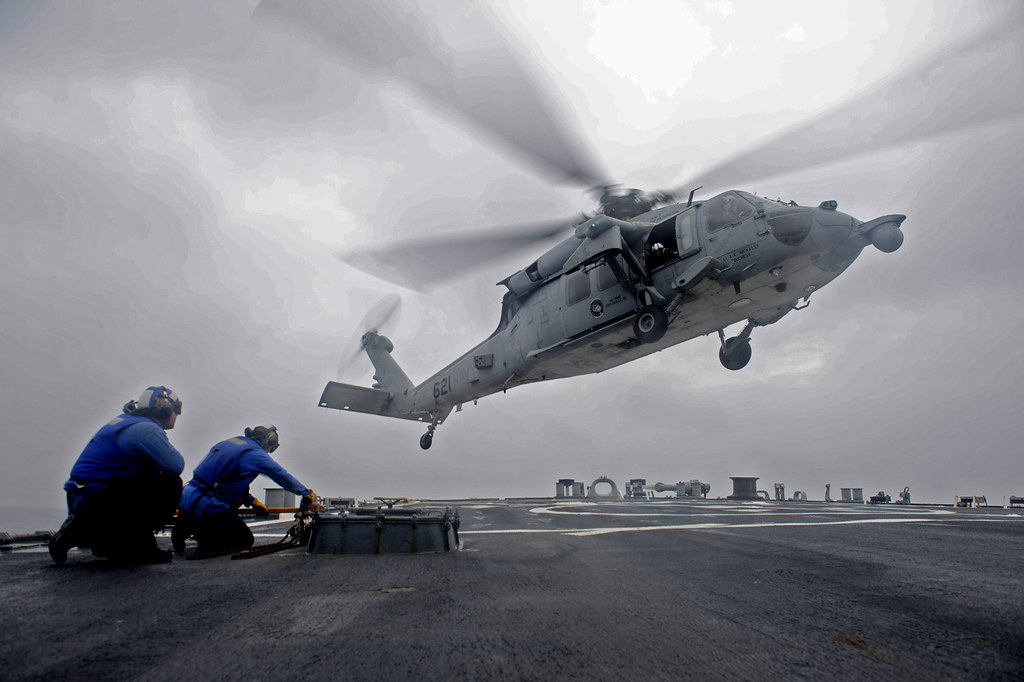Zoe Glasson, Sophie Qin, Madeleine Nyst and Patrick Kennedy
Sea State
US Senator John McCain has made waves around DC with his recently released defence budget white paper, ‘Restoring American Power’. In it, McCain argues for a diversified US military, as opposed to just buying ‘more of the same’. Enter, the much-maligned Littoral Combat Ship (LCS). McCain’s plan calls for the LCS program to be truncated this year and succeeded by a replacement frigate by 2022. To make the move quickly, affordably and at scale, McCain advocates for an acquisition ‘bridge’ until 2022 for the two shipyards building LCSs, allowing them to then compete for the follow-on frigate—with the added benefit of lowering costs and increasing productivity.
China’s People’s Liberation Army Navy (PLAN) commissioned its fifth Luyang III-class (Type 052D) destroyer, the Xining, on 22 January. While the PLAN has four Type 052D vessels currently assigned to its South Sea Fleet, this one’s the first to be allocated to the North Sea Fleet. Aside from the geographical distinction, the Type 052D distinguishes itself in other ways: its anti-submarine warfare capabilities are superior to previous classes. Read more about the improvements here.
And closer to home, Adelaide’s Flinders University has signed a memorandum of understanding with four top French engineering schools for academic and research cooperation relating to Australia’s Future Submarine Program.
Flight Path
War on the Rocks have shepherded us into 2017 with a multi-part series on the future of air superiority. The author, BRIG GEN Alex Grynkewich, is a US Air Force fighter pilot who led the Air Superiority 2030 Enterprise Capabilities Collaboration team responsible for the Air Superiority 2030 Flight Plan released last May. In his series, Grykewich walks us through the importance of, and the capability options for, enabling US air superiority by 2030 in the face of growing challenges like counter-stealth and A2/AD systems. He argues that superiority isn’t a mission, but a necessary condition for the US Navy to gain the upper hand in any strategic theatre. If you want to dive deeper, parts I, II, III and IV of The Future of Air Superiority series are over at WOTR.
The day after the US Senate confirmed him as defense secretary, General James Mattis ordered an inquiry into Lockheed Martin’s F-35 Joint Strike Fighter and Boeing’s plans to build a new Air Force One aircraft. The inquiry follows Trump’s tweet back in December protesting F-35 costs that are ‘out of control’, threatening to replace the program with Boeing’s F/A-18 Super Hornet and pitting two mammoth US defence contractors against one another. Trump met with the CEOs of Lockheed Martin and Boeing this month, securing general promises to reduce costs related to the F-35 and next-generation Air Force One projects. Mattis’ reviews will compare the F-35 and F/A-18, and explore ways to lower operating costs of Air Force One, which is scheduled to enter into service by 2023.
Rapid Fire
Experts predict that President Donald Trump’s decision to create ‘safe zones’ for civilians fleeing the conflict in Syria may lead to greater US involvement in the region. The safe zones appear to be an alternative to admitting refugees into the US, but many fear that such a plan could result in increased numbers of troops on the ground in Syria. Coming on the same day of that announcement was an executive order, titled ‘Rebuilding the US Armed Forces’. While the order’s yet to be posted on the White House website, new Secretary of Defence James Mattis must review it in the next 30 days to assess the readiness of the American Armed Forces and their ability to counter groups like the Islamic State. But that “readiness” is still being jeopardised by the limited number of personnel enlisting in the US Army, which you can read about in this great piece from War is Boring.
The British Armed Forces are facing similar questions. Like their American colleagues, it’s becoming increasingly difficult for the British military, specifically the Army, to recruit individuals willing to serve in their various missions across the globe, including fighting against the Islamic State in Syria and Iraq and training military personnel in Somalia and Afghanistan. But don’t think that the US and the UK are alone in this struggle: India and Syria face a similar dilemma.
Zero Gravity
Russia’s most powerful operational rockets have apparently been grounded and their engines recalled, reportedly due to serious manufacturing issues. In a series of tweets, Russian Deputy PM Dmitry Rogozin warned that those responsible for poor quality control and ‘substitution of technologies’ in the Proton rockets will be ‘severely punished,’ adding that launches will resume in May. Unaffiliated analysis suggests that’s rather optimistic: even in a best-case scenario, the Proton mightn’t be ready for launch until June or July. After the loss of a Soyuz rocket on launch in December last year, the latest development means that Russia enters 2017 with service-limiting questions hanging over the majority of their rocket fleet. That’ll be felt globally—NASA officials are in Russia this week to discuss potential problems with the Soyez vehicles used to ferry astronauts to the International Space Station.
On a brighter note, initial images from GOES-16, the first in NOAA’s fleet of next-generation weather satellites, came down recently. Among the stunning images released is an updated ‘Blue Marble’—but careful, the full resolution of these pictures is around 27 megabytes! Such high-quality data will be gathered to feed into baseline atmospheric monitoring and to characterise extreme weather events.
Finally, consider as eye candy the new spacesuits Boeing debuted this week: the Starliner ‘Boeing Blues’.
Zoe Glasson, Sophie Qin, Madeleine Nyst and Patrick Kennedy are research interns at ASPI. Image courtesy of Flickr user US Pacific Command.
This article first appeared on the ASPI "The Strategist" Blog and is reposted here under a Creative Commons license.


 Logging you in...
Logging you in...